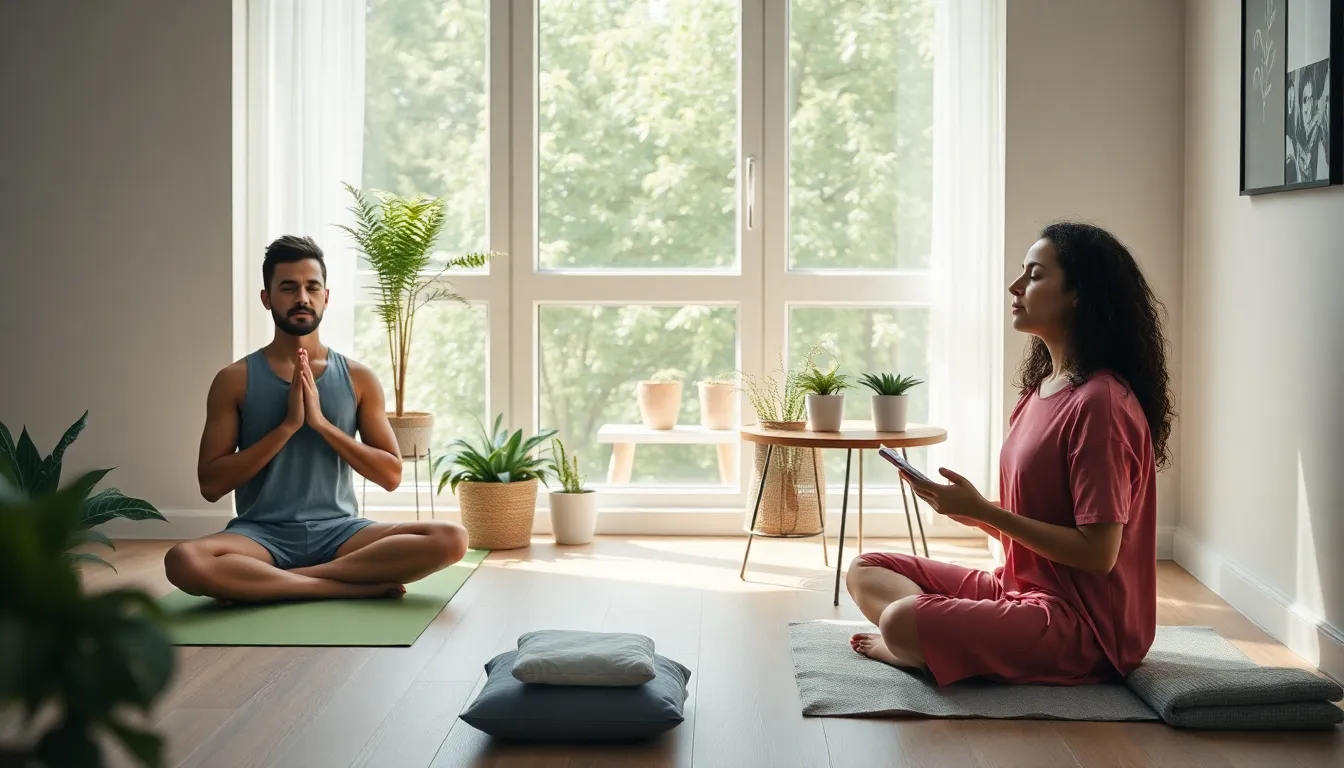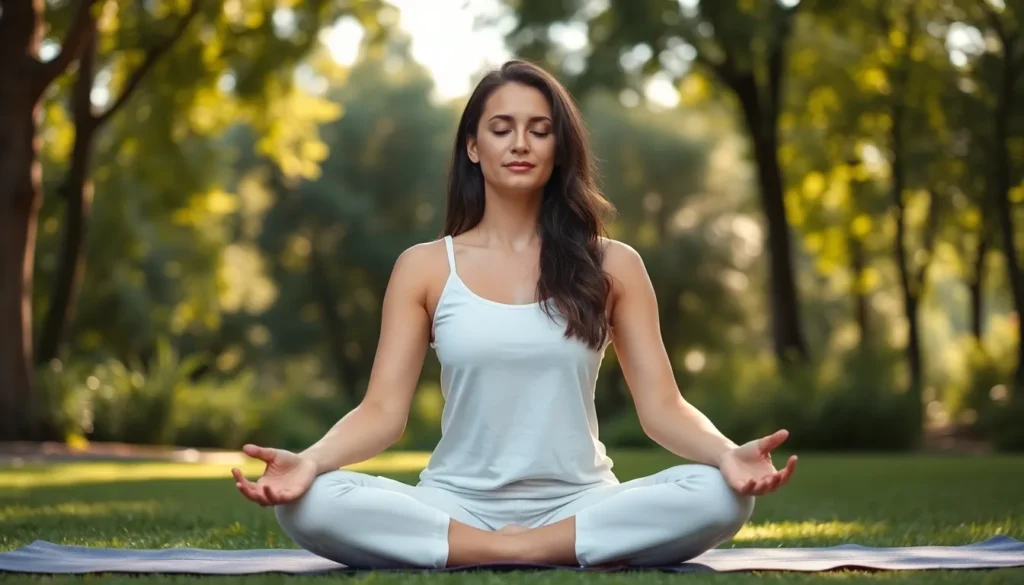In today’s fast-paced world, finding moments of peace can feel like a challenge. Mindfulness habits offer a powerful antidote, enabling individuals to cultivate awareness and presence in their daily lives. By incorporating simple yet effective practices, anyone can transform their mental landscape and embrace a more balanced existence.
These habits don’t require extensive time commitments or special skills. Instead, they focus on being fully engaged in the moment, whether through meditation, mindful breathing, or even mindful eating. As people explore these techniques, they often discover profound benefits, including reduced stress and improved emotional well-being. Embracing mindfulness can lead to a more fulfilling and intentional life, making it a vital practice for anyone seeking tranquility amidst the chaos.
Table of Contents
ToggleUnderstanding Mindfulness Habits
Mindfulness habits involve practices that enhance awareness and presence in daily situations. These habits promote mental clarity and emotional regulation, contributing to overall well-being.
Definition of Mindfulness
Mindfulness refers to the intentional focus on the present moment without judgment. This practice encourages individuals to observe their thoughts, feelings, and surroundings with acceptance. By cultivating mindfulness, individuals develop a deeper understanding of their mental and emotional states, allowing for improved responses to stressors.
Importance of Mindfulness Habits
Mindfulness habits offer several significant benefits.
- Stress Reduction: Regular practice diminishes stress levels by fostering a calm state of mind. Research indicates that individuals practicing mindfulness experience lower cortisol levels.
- Emotional Regulation: Mindfulness enhances emotional resilience. Practicing awareness allows individuals to recognize and manage their emotions more effectively, reducing impulsivity during stressful experiences.
- Improved Focus: Mindfulness improves attention span. Engaging in these practices helps refine concentration abilities, enabling individuals to maintain focus on tasks without distraction.
- Enhanced Relationships: Mindfulness fosters empathy and compassion. Engaging fully in interactions promotes stronger, more meaningful connections with others.
Incorporating these habits leads to a more intentional and fulfilling life, allowing individuals to navigate challenges with greater ease.
Common Mindfulness Habits

Individuals can integrate various mindfulness habits into their daily routines. These practices promote awareness and presence, enhancing overall well-being.
Daily Meditation Practices
Daily meditation practices foster a deeper connection to the present moment. Individuals can start with just five to ten minutes per day, focusing on their breath or using guided sessions. Research shows that even brief meditation can reduce stress and improve emotional health. Experts recommend exploring different techniques, such as:
- Focused Attention: Concentrate on a single point, like the breath or a mantra.
- Body Scan: Systematically observe bodily sensations from head to toe.
- Loving-Kindness Meditation: Cultivate feelings of compassion towards oneself and others.
Breathing Exercises
Breathing exercises serve as effective tools for grounding and calming the mind. They can be practiced anywhere and require minimal time. Regular engagement in these exercises can lead to lower cortisol levels and improved focus. Key techniques include:
- Diaphragmatic Breathing: Inhale deeply through the nose, allowing the abdomen to rise and fall.
- Box Breathing: Inhale for a count of four, hold for four, exhale for four, and hold again for four.
- 4-7-8 Breathing: Inhale for four seconds, hold for seven, exhale for eight.
Journaling for Mindfulness
- Gratitude Journaling: Write down three things to be grateful for each day.
- Stream of Consciousness: Write freely without worrying about grammar or structure.
- Reflection Prompts: Respond to specific questions or topics related to daily experiences and emotions.
Benefits of Mindfulness Habits
Mindfulness habits offer numerous advantages that significantly improve overall well-being. These practices provide tools for managing stress and enhancing daily life experiences.
Improved Mental Health
Improved mental health manifests through reduced symptoms of anxiety and depression. Research indicates that regular mindfulness practice lowers cortisol levels, which alleviates stress. Individuals practicing mindfulness experience greater feelings of calm and tranquility, fostering a positive mindset. Evidence shows that consistent engagement in mindfulness techniques correlates with decreased rumination and improved life satisfaction, promoting emotional resilience.
Enhanced Focus and Awareness
Enhanced focus and awareness result from implementing mindfulness habits into daily routines. Mindfulness training sharpens attention and improves cognitive flexibility, enabling better task completion. Studies highlight that participants who practice mindfulness show significant improvements in concentration and task execution. This heightened awareness allows individuals to engage more fully with their environment, cultivating presence in both personal and professional settings.
Better Emotional Regulation
Better emotional regulation arises from the ability to observe thoughts and feelings without immediate reaction. Mindfulness practices encourage individuals to acknowledge emotions constructively, leading to improved coping strategies. Research confirms that mindfulness enhances emotional intelligence, allowing individuals to respond to situations more effectively. This approach fosters healthier relationships, as greater empathy and compassion develop through heightened emotional awareness.
Tips for Incorporating Mindfulness Habits
Incorporating mindfulness habits into daily life enhances awareness and promotes well-being. Below are effective strategies for making mindfulness a consistent part of everyday routines.
Start Small and Gradual
- Begin with brief practices. Short sessions of two to five minutes are ideal for newcomers to mindfulness.
- Expand duration slowly. Incrementally increase practice time as comfort grows, aiming for sessions of 10 to 20 minutes.
- Choose simple techniques. Focus on mindful breathing or body scans to cultivate mindfulness without feeling overwhelmed.
- Set realistic expectations. Small, consistent practices yield significant benefits over time.
Create a Routine
- Schedule specific times. Designate moments daily for mindfulness, such as during mornings or before bed.
- Pair habits. Integrate mindfulness with existing routines, like practicing deep breathing while making coffee or meditating post-work.
- Use triggers. Engage in mindfulness practices after routine actions, such as brushing teeth or settling into a chair.
- Track progress. Record daily mindfulness activities to monitor consistency and reinforce commitment.
Use Technology Wisely
- Explore mindfulness apps. Utilize applications like Headspace or Calm that offer guided meditations and reminders.
- Set alerts. Enable notifications on devices to prompt daily mindfulness practices, ensuring moments of awareness aren’t overlooked.
- Watch informative content. Engage with videos or podcasts that delve into mindfulness techniques for deeper understanding.
- Avoid distractions. Limit notifications and social media during mindfulness practices to maintain focus and presence.
Embracing mindfulness habits can transform daily life by fostering a deeper connection to the present moment. These practices are accessible and can be seamlessly woven into even the busiest schedules. By prioritizing mindfulness, individuals not only enhance their mental well-being but also cultivate resilience and emotional intelligence.
The journey toward a more mindful existence doesn’t require grand gestures. Small, consistent efforts can lead to profound changes in how one navigates challenges and relationships. As individuals integrate these habits into their routines, they’ll likely discover a newfound sense of clarity and peace. Mindfulness isn’t just a practice; it’s a pathway to a more intentional and fulfilling life.





